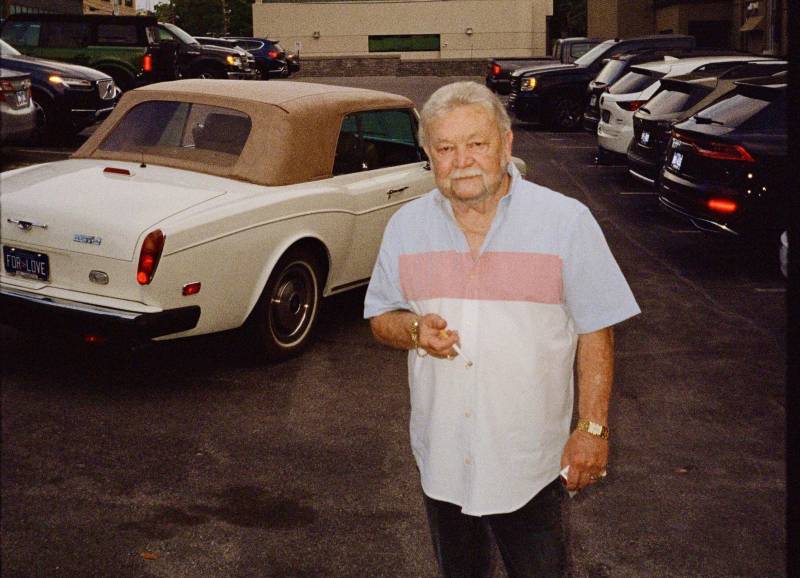Transcript:
A MARTÍNEZ, HOST:
Rusty Williams is not famous. Perhaps if things had happened differently, he could have been. He’s a singer who wanted to make it in the music business. And now, at 78, his famous granddaughter is helping his dream come true. NPR’s Milton Guevara has the story.
MILTON GUEVARA, BYLINE: Rusty Williams has been making music since he was seven.
RUSTY WILLIAMS: I wanted to sing, and that’s what I did.
GUEVARA: Beginning in the early ’70s, Williams and his producer friend, Frank Morris, got in the studio to record some of the songs they wrote.
(SOUNDBITE OF SONG, “RIVERBOAT GAMBLER”)
R WILLIAMS: (Singing) He’s a riverboat gambler and he knows what to play. When the cards fall wrong, there’ll be another day. If he don’t win a hand, he’ll take what he can. Take what he can.
GUEVARA: But when Williams presented those recordings to bigwigs in Nashville, he was told to change them.
R WILLIAMS: Go home and make them country. I said, I am not country. Don’t want to be country.
GUEVARA: So Williams stood his ground and refused to release the would-be album. The tapes were shelved, and as time passed…
R WILLIAMS: I forgot about them.
GUEVARA: Although he let the recordings collect dust, he never forgot about the music.
HAYLEY WILLIAMS: I had heard him play some of those songs on the piano when I was really, really young.
GUEVARA: That’s his granddaughter, Hayley. Those songs lit a fire.
R WILLIAMS: And when she started talking about – she would say, granddad, how do I get in the music business? I said, baby, you got to want it.
GUEVARA: She did want it. While Rusty never became the big-time singer in the family, Hayley Williams did.
(SOUNDBITE OF SONG, “ALL I WANTED”)
H WILLIAMS: (Singing) All I wanted was you.
GUEVARA: She’s the lead singer of Paramore, a rock band that has toured the world many times over. It wasn’t until recently that she realized her grandfather almost had an album of his own. Rusty’s producer friend had dug up the old recordings and sent them to the family.
H WILLIAMS: I think they were moving houses, or they were doing something and going through a bunch of old stuff. And somehow, it just came up that granddad really wanted to have all of this music and be able to listen to it just for himself.
GUEVARA: And Hayley’s bandmate in Paramore, Zac Farro, happens to run a record label. When he heard Rusty’s music…
H WILLIAMS: He was like, this is incredible. Like, we need to do something with this, you know? And the next thing I knew, we had everything digitized.
(SOUNDBITE OF SONG, “KNOCKING (AT YOUR DOOR)”)
R WILLIAMS: (Singing) Won’t you tell me, tell me now? So I will be knocking, only knocking at your door. And while your heart is aching, you know mine is brеaking, for you won’t let me in. No, you won’t let mе in anymore.
H WILLIAMS: I probably hang out with gran and granddad more than anyone else in my life, and I hear stories all the time. But when you get to actually experience a piece of that history, and it gets brought into the present with you, that’s just, like, better than a photo album. It’s like you’re sitting there with all of it in the moment.
GUEVARA: Some of the moments in the music capture Rusty’s love for Sharon, his wife of 60 years.
H WILLIAMS: What’s your favorite one, granddad, if you had to pick?
R WILLIAMS: “Every Time I’m High.”
H WILLIAMS: Oh, I love that song.
(SOUNDBITE OF SONG, “EVERY TIME I’M HIGH”)
R WILLIAMS: (Singing) Every time I’m high, I love you. Every time I’m low, I need you.
I’m going to cry.
H WILLIAMS: Aw.
(LAUGHTER)
H WILLIAMS: Granddad cries pretty easy these days.
GUEVARA: Better late than never. At 78, Rusty Williams finally released his debut album. It’s called “Grand Man.”
Milton Guevara, NPR News.
(SOUNDBITE OF SONG, “ANGEL EYES”)
R WILLIAMS: (Singing) Oh, angel eyes. Oh, angel eyes.
H WILLIAMS: Granddad, you did your first NPR interview.
R WILLIAMS: I did, and that made me famous.
(SOUNDBITE OF SONG, “ANGEL EYES”)
R WILLIAMS: (Singing) And now that I’ve found you, I’ll never let you…



